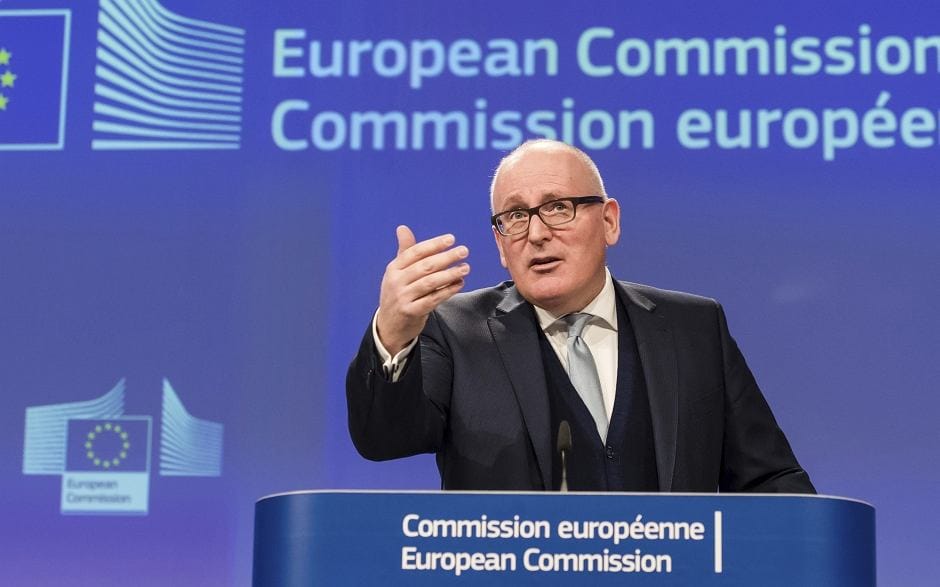Timmermans o chrześcijańskim dziedzictwie Europy: największe zagrożenie to odczłowieczanie "innego"
"Moje chrześcijańskie dziedzictwo nic dla mnie nie znaczy, jeśli prowadzi do wykluczania innych niż my (...) Jeśli bycie chrześcijaninem nauczyło nas czegokolwiek przez ostatnie dwa tysiące lat, to umiejętności patrzenia na świat oczami "innego". Nawet, gdy jest to afrykański uchodźca" – OKO.press tłumaczy przemówienie Timmermansa wygłoszone w Watykanie
Na otwarcie konferencji "(Re)thinking Europe" 27 października 2017 Frans Timmermans wygłosił przemówienie o europejskim kryzysie wartości. Timmermans to holenderski polityk i dyplomata, były minister spraw zagranicznych Holandii, od 2014 pierwszy wiceprzewodniczący Komisji Europejskiej.
(...) Najwyższy zaszczyt, jakiego mógł dostąpić Rzymianin w czasach antycznych, to otrzymać tytuł Pontifexa – budowniczego mostów. Z tego powodu Ojciec Święty również nosi tytuł Pontifexa. Dlaczego był to najwyższy zaszczyt? Ponieważ budowanie trwałych i porządnych mostów jest niezwykle skomplikowane. A poza tym zbudowanie mostów nad przepaściami, których wcześniej nie można było przekroczyć, wywiera ogromny wpływ na społeczeństwo.
Problem, z którym mierzymy się dzisiaj w Europie, to czwarta rewolucja przemysłowa – i jest ona najgorsza ze znanych dotychczas ludzkości, ponieważ wprowadza najwięcej drastycznych zmian. Będzie miała wpływ na każdego człowieka na Ziemi.
To rewolucja, która zmieni sposób, w jaki żyjemy i w jaki pracujemy, ale także relacje wewnątrz i pomiędzy społeczeństwami. Dodatkowo dzieje się ona w środowisku naturalnym, które nie wytrzymuje już sposobu, w jaki funkcjonujemy. W związku z tym będziemy musieli go zmienić. Jednocześnie naokoło toczą się inne radykalne zmiany: populacja Europy szybko się zmniejsza, zmniejsza się też nasz udział w światowej gospodarce. Dookoła za to widzimy same zagrożenia.
Największe zagrożenie dla Europy to kryzys wartości
Ladauto Si [druga encyklika papieża Franciszka, zaprezentowana 18 czerwca 2015 w Watykanie - red.] jest jednym z najbardziej inspirujących dokumentów, jakie przeczytałem w czasie ostatnich lat. Encyklika jest pierwszym dokumentem, który przedstawia kompleksową, intelektualną i moralną odpowiedź na wyzwanie, jakim jest zrównoważony rozwój. Jest ona mocno związana ze sprawiedliwością społeczną, ponieważ przejmowanie coraz większej części zasobów naturalnych – kosztem innych ludzi – jest przeciwne sprawiedliwości społecznej. I to również musimy naprawić.
Ale co, moim zdaniem, jest największym zagrożeniem dla Europy? Na skutek czwartej rewolucji przemysłowej – kryzysu finansowego, kryzysu bankowego, fiskalnego, kryzysu uchodźczego i kryzysu terrorystycznego – znajdujemy się w głębokim kryzysie wartości.
Unia Europejska jest zbudowana na kilku wartościach, ale najważniejszą z nich jest solidarność. Po dwóch niemal samobójczych wojnach w ostatnim stuleciu najważniejsza zasada Europy to: "Mój sukces będzie zależał od twojego sukcesu". To ekstrapolacja podstawy religii chrześcijańskiej i większości religii: "Traktuj bliźniego jak siebie samego, albo tak, jak ty chciałbyś być traktowany". Ta zasada stanowi podstawę Europy – zamiast myśleć: "Osiągnijmy szczęście poprzez dominację nad innymi" zaczęliśmy myśleć: "Dzielmy się i wszyscy bądźmy szczęśliwi, bo nie mogę być szczęśliwy, wiedząc, że mój sąsiad jest nieszczęśliwy".
Dziedzictwo chrześcijańskie powinno być punktem wyjścia do dialogu
Abstrahując od dyskusji na temat judeo-chrześcijańskich korzeni Europy, to jest zasada, którą dzielimy z większością religii. Dokładnie ta wartość jest obecnie zagrożona z powodu zjawiska, które w sektorze finansowym nazywa się "pokusą nadużycia". Innymi słowy: co z tego, że ja dzielę się z moim sąsiadem, jeśli mojego sąsiada nie obchodzi mój los. Ja się z nim podzielę i będę biedniejszy, a on się na tym wzbogaci. To właśnie wydarzyło się podczas kryzysu finansowego – nigdy nie nastąpiła konwergencja, którą nam obiecano, a zamiast tego w większości europejskich społeczeństw pogłębiły się nierówności. To wydarzyło się także podczas kryzysu migracyjnego, gdy niektóre kraje członkowskie poczuły się kompletnie osamotnione w ciężarze, które dźwigają.
Dzisiaj wierzymy, że nasze dzieci będą miały w życiu gorzej, niż my. Jeśli jedyna perspektywa, jaką mamy, to strata, zaczynamy pilnie strzec tego, co posiadamy. Wtedy sąsiad staje się wrogiem, a nie przyjacielem – jest to więc sprzeczne z zasadą solidarności. Jeśli widzę, że ktoś cierpi i obawiam się, że też mogę zacząć cierpieć, będę się trzymał od tej osoby z daleka – żeby się nie zarazić. To właśnie dzieje się dzisiaj w Europie (...) i musimy to naprawić.
Jako chrześcijanin uważam, że nie możemy tego naprawić poprzez podziały na "lepszych i gorszych". Pomyślcie o tym – często opowiadamy o naszym dziedzictwie judeo-chrześcijańskim. Czy robimy to dlatego, że chcemy, żeby był to punkt wyjścia do dialogu? Czy dlatego, że chcemy wykluczyć tych, którzy nie mają tego samego dziedzictwa? Pomyślcie o tym.
Bycie chrześcijaninem to patrzenie na świat oczami "innego"
Moje chrześcijańskie dziedzictwo nic dla mnie nie znaczy, jeśli prowadzi do wykluczania innych. To nie jest moje chrześcijaństwo. Ja zostałem wychowany i wyedukowany przez jezuitów i franciszkanów, i zapewne dlatego dzisiaj jestem socjalistą. (...) Tak, a jednocześnie mówię tak, jak wy i wyglądam tak, jak wy. Nic niebezpiecznego.
Nauczyłem się, że wiara to nie jest absolutna pewność. To postawa "Ciągle się uczę". To otwartość na ludzi o innych poglądach. Chęć uczenia się od innych, a nie bezmyślne zaprzeczanie innym poglądom. (...)
Jeśli chcemy, żeby Unia Europejska złapała drugi oddech, to musimy traktować nasze dziedzictwo jako zaproszenie, a nie jako przeszłość.
Największym zagrożeniem dla nas jako wspólnoty i społeczeństwa jest odczłowieczanie "innego". To osiągnięcie ludzkości, które regularnie powraca podczas dwóch tysięcy lat europejskiej historii. Odczłowieczamy "innego", a potem tworzymy prawo do wykluczenia go ze społeczeństwa, czasem nawet do zabicia go. Odczłowieczamy go z powodu religii, przynależności etnicznej, pochodzenia.
Jeśli bycie chrześcijaninem nauczyło nas czegokolwiek przez ostatnie dwa tysiące lat, to umiejętności patrzenia na świat oczami "innego". Nawet, gdy jest to afrykański uchodźca w łódce dryfującej po Morzu Śródziemnym. Dziękuję.
Absolwentka studiów europejskich na King’s College w Londynie i stosunków międzynarodowych na Sciences Po w Paryżu. Współzałożycielka inicjatywy Dobrowolki, pomagającej uchodźcom na Bałkanach i Refugees Welcome, programu integracyjnego dla uchodźców w Polsce. W OKO.press pisała o służbie zdrowia, uchodźcach i sytuacji Polski w Unii Europejskiej. Obecnie pracuje w biurze The New York Times w Brukseli.
Absolwentka studiów europejskich na King’s College w Londynie i stosunków międzynarodowych na Sciences Po w Paryżu. Współzałożycielka inicjatywy Dobrowolki, pomagającej uchodźcom na Bałkanach i Refugees Welcome, programu integracyjnego dla uchodźców w Polsce. W OKO.press pisała o służbie zdrowia, uchodźcach i sytuacji Polski w Unii Europejskiej. Obecnie pracuje w biurze The New York Times w Brukseli.

Komentarze